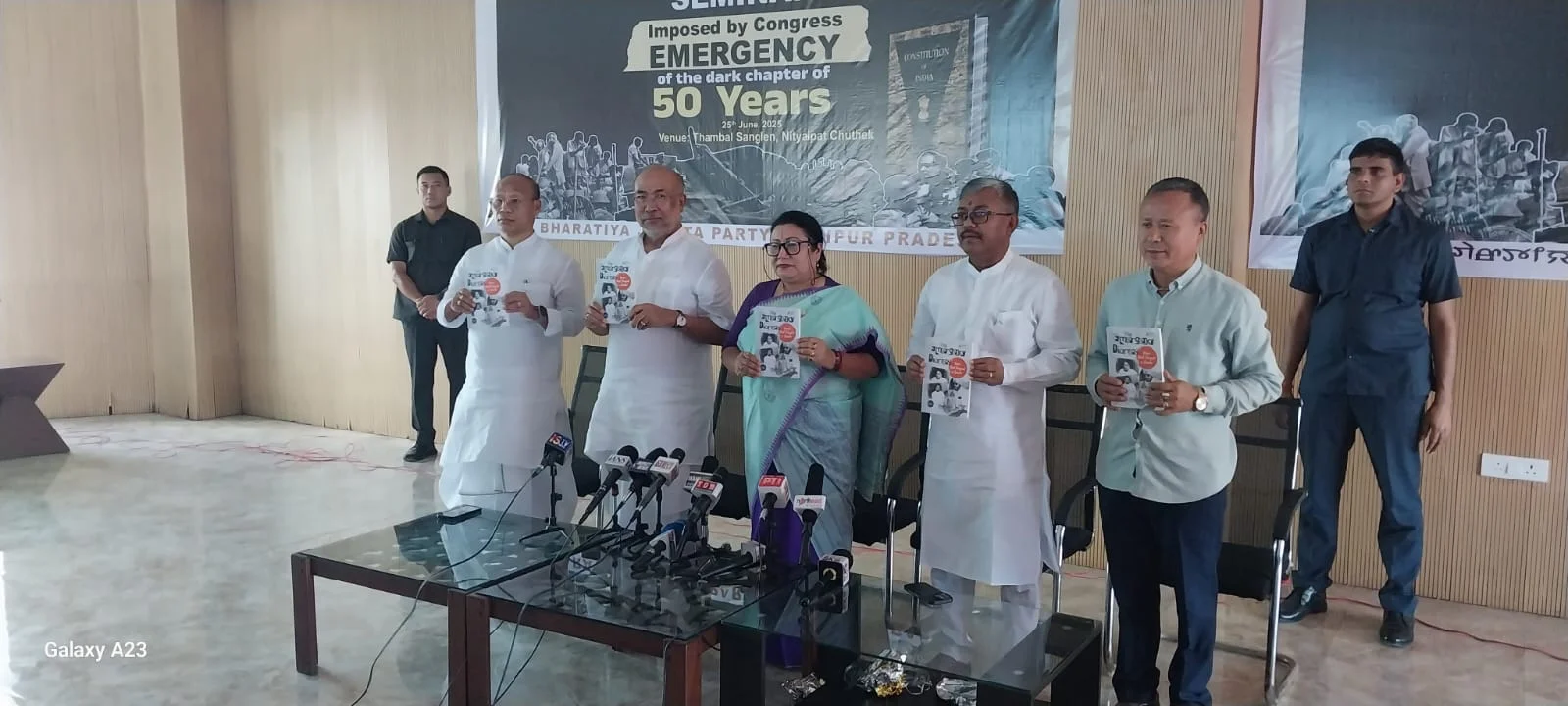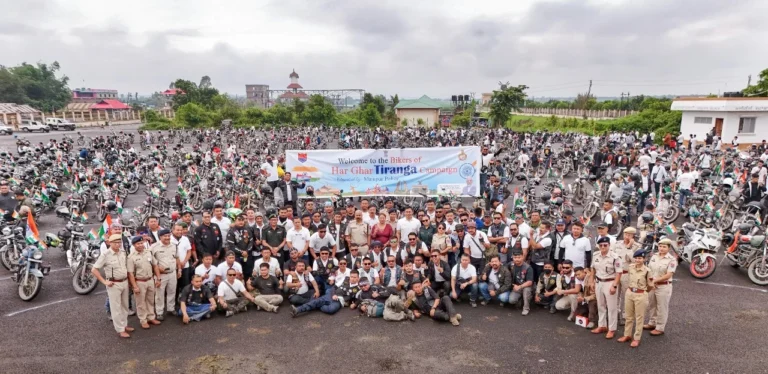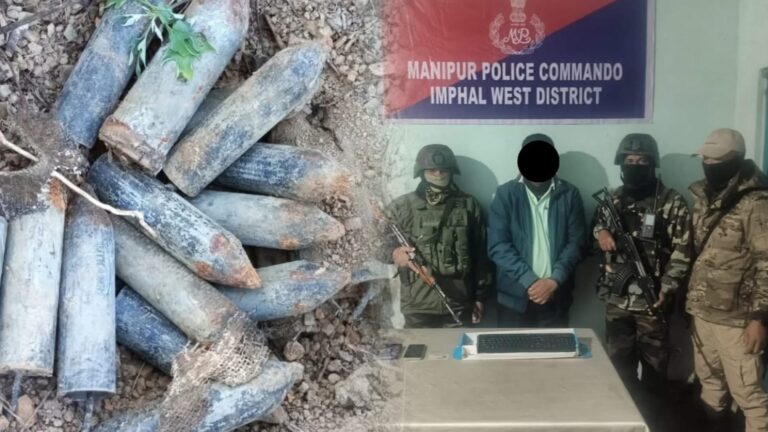Former CM Biren Singh Releases Emergency Diaries
Former Manipur Chief Minister and BJP leader N. Biren Singh today released Prime Minister Narendra Modi’s latest book, Emergency Diaries, at the BJP state headquarters in Imphal’s Thambal Shanglen. During the event, Biren Singh reflected on the Emergency period of 1975, noting that 10 people from Manipur were arrested and jailed. He emphasized the importance of acknowledging historic injustices to build a “clean and just future,” stating that confronting past wrongs is crucial for societal progress. He also connected this reflection with ongoing efforts in Manipur to correct past misdeeds and restore justice in the wake of recent communal unrest
Introduction
Ever think about how a book can double as a time machine? Today, Biren Singh hit “play” on a powerful reminder—recalling the turbulent Emergency of 1975 through PM Modi’s Emergency Diaries. But this wasn’t just a book launch. It was a heartfelt journey into Manipur’s past, its scars, and its hopes for redemption. Ready to explore why this moment matters? Let’s break it down step by step.
1. What’s Emergency Diaries all about?
Published by Prime Minister Narendra Modi, this book dives into his personal experiences and reflections from the Emergency era, when India grappled with suspended democratic rights. It offers first-hand stories—his time as an RSS pracharak, the societal upheaval he witnessed, and lessons he gleaned about governance and democracy . It’s more memoir than history, a cautionary tale from someone who lived through those uncertain days.
2. Why did Biren Singh release it in Imphal?
Biren Singh isn’t just any political figure—he’s Manipur’s former Chief Minister, deeply familiar with both grassroots emotions and political shifts. By releasing the book in Imphal:
- He underlines regional relevance—connecting national history with local experiences.
- He signals intellectual leadership, inviting Manipur’s thinkers to reflect on democracy’s fragility.
- He ties the narrative to his political vision of justice and reform .
This isn’t mere symbolism—it’s a conscious effort to engage his state in national discourse.
3. Reflections on the Emergency
At the event, Biren Singh questioned: “If we don’t fix past errors, how can we dream of a better future?” He noted that during 1975, ten Manipuris were jailed during the Emergency, grounding the story in local history
These arrests may seem small compared to national statistics—but for a tight-knit region like Manipur, even a few souls behind bars marks a collective trauma. And acknowledging that trauma is the first step toward healing.
4. Linking past to present unrest in Manipur
Is the Emergency history relevant in 2025? According to Biren Singh, yes.
He suggested that the recent violence in Manipur stems from broader efforts to address and rectify past wrongs. His argument: shifting societal structures—however necessary—can rattle the boat. But this turbulence is a sign of progress, not failure .
It’s a bold claim: that unrest is less rebellion, more recalibration.
5. The book release – a gathering of minds
Thambal Shanglen in Keishampat buzzed with guests—party leaders, academicians, intellectual voices, and civic-minded individuals . It wasn’t a flash mob—it was carefully curated, a cross-section of stakeholders in Manipur’s future.
That convergence reflects the event’s intent: beyond politics, it’s a forum for reflection, for taking stock of where democracy has steered us and where it might lead next.
6. Why facing the past matters
Biren Singh’s message wasn’t nostalgic or partisan. He framed it as practical:
- Truth builds trust—ignoring historic errors keeps societies fragile.
- Accountability shapes futures—long-term stability hinges on confronting old wrongs.
- Empowerment thrives in clarity—a society that knows its history can make informed decisions.
It’s like cleaning your house before the guests arrive—if you want a stable future, you start by tidying up history.
7. Political and intellectual reverberations
Here’s why the event matters:
- For the BJP, a party deeply woven into Emergency narratives, it reinforces their ideological foundation.
- For Manipur, it sparks open conversation on rights, governance, and democratic responsibility.
- For India, it contributes to a broader trend: regional leaders acting as catalysts for national introspection.
It’s not just political theater—it’s symbolic of a maturing democracy.
8. How it shapes public discourse
Expect to see ripples:
- Academics could build symposiums around the Emergency—what it meant nationally vs regionally.
- Civil society might frame it in context of Assam-Mizoram refugee tensions or tribal autonomy debates.
- Media may tie it to Biren Singh’s resignations, President’s Rule, and ongoing Manipur volatility.
The conversation is only beginning—and a book release is a great sort of spark plug.
9. What’s next?
Following the release:
- Panel discussions could expand the dialogue to arts, history, and human rights.
- Book clubs might analyze it, chapter by chapter.
- Schools and universities could include it in curricular discussions on Emergency-era India.
- Policy forums might use its insights to shape democratic resilience in the Northeast.
The event wasn’t an endpoint—it was a launch, not just of a book, but of an idea.
10. The takeaway for Manipur and India
What should a reader feel?
- Recognize the Emergency’s shadow on our political psyche.
- Understand that regional histories matter.
- Accept that conflicts, while messy, often signal transformation.
- Embrace open discussion as democracy’s lifeblood.
Biren Singh’s words and gesture nudge us toward a society that learns from its past—not one enslaved by it.
Conclusion
Releasing Emergency Diaries amid Manipur’s fragile calm was no accident. Biren Singh offered more than a political reading—he delivered an invitation: to remember, reflect, and rebuild. In a state emerging from violence and under President’s Rule, such reminders aren’t just symbolic—they’re essential. If democracy is a muscle, it needs flexing: scrutiny, dialogue, and above all, the humility to learn.
Frequently Asked Questions
- What is Emergency Diaries about?
It’s a memoir by PM Modi reflecting on his role and observations during India’s 1975 Emergency, offering rare personal insights. - Why did Biren Singh highlight the Emergency now?
He sees parallels between past democratic breakdowns and present efforts to restore justice in Manipur, using history as a guide. - Who attended the event?
A mix of BJP leaders, academics, cultural figures, and public-minded citizens—all coming together to reflect on democracy. - How many people from Manipur were arrested during the 1975 Emergency?
According to Biren Singh, ten individuals from Manipur were arrested and jailed during that period - Will the book event lead to public discussions in Manipur?
Quite possibly—organizers often follow such launches with talks, panels, and academic events to deepen debate.


